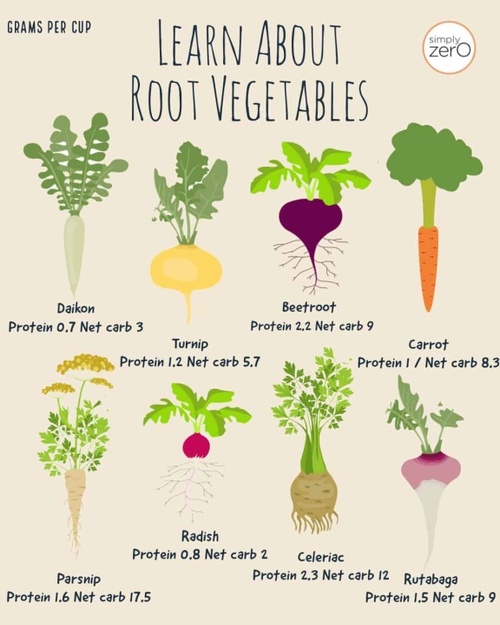

Root vegetables are packed with fiber and antioxidants, and low in calories, fat, and cholesterol. Root vegetables are also excellent sources of carotenoids. These are naturally occurring pigments that may decrease the risk of certain cancers and help protect your eyes.
Root vegetables are grown underground and include onions, garlic, carrots, potatoes, and beets, among others. They offer a variety of flavors and can be prepared in many ways. They're also dense in essential nutrients and come with a number of health benefits.
What Are Root Vegetables?
Root vegetables are starchy veggies that grow underneath the soil. The starchy part, called the storage organ, grows underground while other parts of the plant grow through the soil and to the surface. The storage organ provides the rest of the plant with the nutrients it needs to keep growing.
While the peak season for most root vegetables is spring through fall, they're available all year long.
Examples of Root Vegetables
There are many kinds of root vegetables, some of which you're probably familiar with.
Bulbs. These root vegetables have a large bulb where nutrients are stored. Some examples of bulb vegetables include:
Fennel
Onions
Shallots
Garlic
Corms. Corms have short, thick stems. Some examples of corms include:
Celery root
Water chestnut
Taro
Tubers. Tubers grow underground horizontally. They include:
Potatoes
Sweet potatoes
Yams
Yucca (cassava)
Root crops. These are starchy vegetables with roots, such as:
Beets
Parsnips
Turnips
Rutabagas
Carrots
Jicama
Maca
Nutrients in Root Vegetables
Root vegetables are packed with fiber and antioxidants, and low in calories, fat, and cholesterol. Root vegetables are also excellent sources of carotenoids. These are naturally occurring pigments that may decrease the risk of certain cancers and help protect your eyes.
Root vegetables with carotenoids are brightly colored, including:
Sweet potatoes
Carrots
Rutabagas
Turnips
Experts say it’s best to eat a variety of colors of vegetables. Different colors signal different nutrients, vitamins, and minerals. In general, root vegetables are e good sources of:
Potassium
Folate
Complex carbohydrates
Fiber
Vitamins A, B, and C
Manganese
Health Benefits of Root Vegetables
Some popular root vegetables are especially rich in certain essential nutrients.
Carrots. Carrots have high levels of beta carotene, a carotenoid. Inside the body, beta carotene is turned into vitamin A. In addition to helping your eyes, vitamin A supports a healthy immune system.
Beets. Beets have high levels of betaine, an antioxidant that has heart benefits. They contain nitrates, which support better circulation and help lower blood pressure. Beets are also good sources of:
Potassium
Manganese
Iron
Folates
B vitamins
Beets have the most sugar of any vegetable, but they're still low in calories.
Potatoes. Potatoes are one of the most popular root vegetables. A medium-sized baked potato has only 164 calories but provides you with 935 milligrams of potassium. That’s twice the amount of potassium found in a banana. Potatoes are also good sources of vitamin C and B6.
Turnips.Turnips are high in vitamin C, which supports a healthy immune system and helps fight off infections. They're also rich in fiber, which can aid in digestion, and are good sources of:
Vitamin A
B vitamins
Vitamin C
Calcium
Iron
Potassium
Manganese
Copper
Sweet potatoes. A medium-sized sweet potato only has 103 calories and 1,096 micrograms of vitamin A. One sweet potato is enough to meet your daily requirement of vitamin A.
Cons of Root Vegetables
Root vegetables are starches. That means they’re rich in carbs that your body turns into glucose, a type of sugar, to use for energy. Your body needs carbs. But if you eat more than your body burns, they'll be stored as fat.
Think of them as you would grains like rice or pasta. Control your portion size. Think of a serving as about the size of your fist.
Eating large servings of root vegetables or other carbs in one sitting can cause your blood sugar to spike. Repeated blood sugar spikes may increase your risk of diabetes. If you already have diabetes, sugar spikes can make it difficult to manage.
Written by
Reviewed by
Dan Brennan, MD
November 09, 2021
